Esfahak, one of Best Tourism Villages in world, to host special festival

TEHRAN – Esfahak, recently recognized as one of the world’s Best Tourism Villages by UN Tourism, is set to host a special rural festival from June 12 to 14, according to the head of the Tabas Cultural Heritage, Tourism, and Handicrafts Department.
According to Miras Arya (CHTN), Mohammad Arab stated that the event named “Dastineh festival” is dedicated to children aged five to eight, aiming to celebrate local culture, traditions, and crafts while offering visitors a unique insight into rural life in this acclaimed desert village.
It will be held with cooperation of Tabas Cultural Heritage, Tourism, and Handicrafts Department, IvarArc group, and 3-Goosheh group, the official added.
He also said that the three-day event aims to familiarize children with the cultural heritage and handicrafts of Esfahak village, promote creative skills, know local culture, strengthen their sense of tourism and culture in an entertaining and scientific environment.
Arab continued that some of the programs include training cultural heritage and handicrafts concepts in easy language, promoting movement and artistic capabilities of children in various fields, promoting local games and traditional music, strengthening a sense of belonging and respect for culture, creating artistic items such as painting, potteries, and local dolls, rural tourism and getting to know the landscapes, houses, and culture of the village, describing and introducing the cultural heritage and handicrafts in childish language, water play and free outdoor games. A certificate of attendance will be issued to participants at the end of the course, he added.
Arab mentioned promoting culture and art among the younger generation, creating a sense of self-confidence and creativity in children, and developing an effective connection between cultural heritage and the child's community as among the benefits and long-term goals of this project, which is scheduled to be held continuously in this beautiful village.
He also said: Attracting families and developing cultural tourism in the village, visiting attractive places, houses, traditional uses, telling local stories, introducing simple handicrafts and trying to create what is engraved in the minds of children, painting village landscapes and handicrafts, creating collages or village paintings, group games, sewing dolls with fabric and thread, making simple shapes with dough and clay, showing films related to cultural heritage, getting to know the culture of waste separation and environmental protection, holding an exhibition of created works, and public visits to the exhibition are other programs planned.
He recalled that Esfahak was introduced and registered as the Second Best Tourism Village of UN Tourism in November 2024.
“By implementing scientific and training programs, we plan to turn this beautiful village to a base for scientific tourists.”
The village of Esfahak in South Khorasan province has been awarded one of UNESCO’s 34 prestigious research chairs, marking an achievement for the local and national cultural heritage and scientific communities.
The announcement was made by Arab in May 2025, who confirmed that Esfahak has secured a seat on UNESCO’s Research Commission.
The distinction was granted in recognition of the village’s innovative work in earth architecture and its scientific contributions through the Esfahak Mud Center (E.M.C.), led by architect and researcher Pouya Khazaeli.
Esfahak, one of UN Tourism’s Best Tourism Villages, has drawn international attention for its sustainable reconstruction and architectural preservation efforts. The nomination dossier for global recognition included extensive scientific research conducted by the E.M.C., which played a key role in earning the UNESCO research seat.
“The awarding of this chair is not only a great honor for Esfahak and its people, but it also highlights the village's scientific and cultural potential on a global stage,” said Arab. “It reflects the dedication of the local community, especially its youth, and will help introduce Esfahak’s achievements to more specialized tourism audiences and researchers worldwide.”
UNESCO’s research chairs promote higher education and collaborative knowledge production across the globe in fields such as education, science, and culture. Each chair is established within a university or research institution for a renewable four-year term and must include a distinguished academic leader, researchers, faculty, and students working together in a specialized area of study.
Arab emphasized that Esfahak’s chair will focus on sustainable and traditional building practices, aiming to serve as a model for similar communities around the world while enhancing academic cooperation, knowledge sharing, and cultural tourism.
Last year, Esfahak was named one of the Best Tourism Villages for 2024 by UN Tourism. Moreover, the village won a TO-DO Award in 2020. The award is annually presented by the German Institute for Tourism and Development.
Severely damaged by the 1978 earthquake that struck Tabas, Esfahak was once deemed uninhabitable, with residents living in temporary tents. Later, they built makeshift wooden rooms, known as Otagh-e-Choobi (wooden rooms), as they began rebuilding their lives.
With a commitment to sustainability and cultural preservation, villagers re-established the community over the years, developing eco-lodges and restoring traditional homes using ancient adobe techniques.
Esfahak’s transformation into a cultural and eco-tourism destination has garnered attention for its unique architecture and sustainable practices, earning the village the prestigious Asia Architecture Award. Today, it attracts tourists from across the world, drawn to its picturesque adobe structures and commitment to preserving local identity.
Since 2021, the Best Tourism Villages initiative has aimed to promote sustainable tourism in rural areas, focusing on preserving natural landscapes, cultural heritage, and indigenous lifestyles, including gastronomy and local values.
KD
Leave a Comment